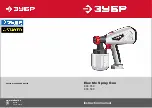
USAGE & CARE INSTRUCTIONS
Work Area
Do not operate power devices in explosive atmospheres, such as in the presence of
flammable liquids, gases, or dust. Power devices create sparks which may ignite the
dust or fumes.
Electrical Safety
Only recharge with the specified chargers for the battery. A charger that is suitable
for one type of battery may create risk of fire when used with another battery. Use
battery operated device only with the specifically designed battery pack. Use of any
other battery may create a risk of fire.
Personal Safety
Stay alert, watch what you are doing, and use common sense when operating a
power device. Do not use device while tired or under the influence of drugs, alcohol,
or medication. A moment of inattention while operating power devices may result in
serious personal injury.
•
Avoid accidental spraying of device. Be sure the device is discharged before
leaving device, whether in storage, driving, or on job site.
•
Do not overreach. Keep proper footing and balance at all times.
•
Use safety equipment. Always wear eye protection and dust mask.
Device Use and Care
Keep device clean and in good working condition. Do not submerge in water.
Service
Device service must be performed only by qualified repair personnel. Service or
maintenance performed by unqualified personnel may result in a risk of injury and/or
electric shock. Any service not performed by Rust-Oleum approved repair personnel
will void warranty.
Safety Rules for SpraySmart
®
Marking Device
When device is charged (compressor has filled device chamber with air preparing
for release of paint) it will spray when it is held in any direction when tilt valve is
pressed. Caution is required while placing the device into the marking wand when
device is charged. Always wear safety glasses to ensure from accidental spray,
wind, etc. A mask is also recommended to ensure that paint spray is not brought
into lungs.
Read paint pouch for safety requirements regarding paint itself.
Battery/Charger
Before reading battery charger, read all instructions and cautionary marking on the
(1) battery charger and (2) the product using the battery. Only use charger which
accompanied your product or direct replacement. Do not substitute any other
charger. Do not disassemble charger or operate the charger if it has been dropped
or damaged in any way. Replace damaged cords or plugs immediately. Incorrect
reassembly or damage may result in electric shock or fire.
•
Do not recharge battery in damp or wet environment. Do not expose charger to
rain or snow. Always check charger’s cord to ensure that there is no damage to
the cord.
•
Charge device in temperatures above +40°F (4°C) and below 105°F (41°C).
Store device and battery pack in locations where temperature does not go below
40°F (4°C) and below 120°F (48°C).
•
Battery leakage may occur under extreme usage or temperature conditions, or
if the device is damaged. Avoid contact with skin and eyes. The battery liquid
is caustic and could cause chemical burns. If liquid comes in contact with skin,
wash quickly with soap and water, then lemon juice or vinegar. If the liquid
contacts your eyes, flush with water for a minimum of 10 minutes and seek
medical attention immediately.
•
Place charger on flat non-flammable surface and away from flammable materials
when recharging battery pack. The charger and battery pack heat during
charging. Carpeting and other heat insulating surfaces block proper air circulation
which may cause overheating. If smoke or melting of the case is observed unplug
the charger immediately and do not use battery pack or charger.
Battery Care/Disposal
The battery is housed inside of device. If device is damaged and batteries are
removed or exposed, do not put batteries into fire or expose to high heat—they
may explode.
•
Do not attempt to disassemble the battery or remove any component. Fire
or injury may result. Prior to disposal, protect exposed terminals with heavy
insulating tape to prevent shorting.
•
If device is damaged, the device and battery (lithium ion) can be disposed of in
municipal solid waste stream.
Warning-Read and understand all instructions. Failure to do so may result in electric shock, fire, and/or personal injury.
SAVE THESE INSTRUCTIONS FOR REFERENCE




















